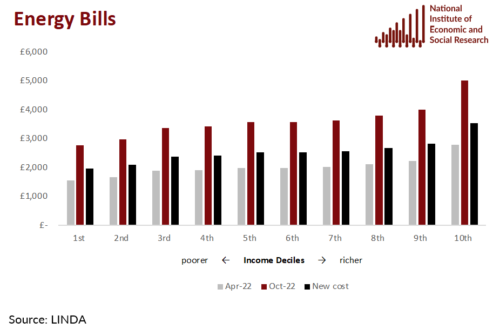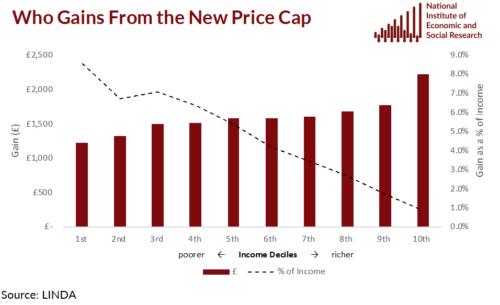NIESR’s Response to the Government’s Energy Bill Plan

NIESR Response to Energy Bill plan
The announcement today of freezing the energy price cap at £2,500 per annum for a typical household for two years will help with the cost-of-living, but it is not sufficiently targeted and unnecessarily expensive compared with the variable price cap that NIESR has proposed.
The new price cap will be noticeably higher than it was in April this year: the poorest households will face energy bills of £1,900 (a rise of £400 a year), which is unsustainable in terms of disposable income and savings.
- This policy is a universal subsidy that will disproportionately benefit the richest households who also have the highest energy consumption: this makes the policy inefficient and expensive, taking the total cost to between £100bn-150bn which is substantially greater than the cost of the furlough scheme during Covid.
- A much more cost-effective option would be a variable price cap (whereby the cost of energy per unit rises with usage): this would further cut the energy bills of the poorest and lower-income households, incentivise energy saving and could have paid for itself.
The rise in the energy price cap from £1,900 to £3,549 was set to increase energy bills by 80%; limiting the rise to £2,500 means this is now only a 30% increase. However, this is still a further rise in the cost of energy, which means the poorest households will be £400 worse off and facing energy bills of nearly £2,000. Although the scale of such an intervention is necessary and likely affordable, it is inefficient in helping those who are hardest hit by the rise in energy prices. The proposal is estimated to cost between £100-150bn and no detail has yet been given on how it will be funded.
Our proposal of a variable price cap – whereby the cost of energy per unit rises with usage – would go further in cutting the bills for the poorest (as they use the least amount of energy) by raising the bills for the richest (who use the most). NIESR’s policy paper shows that this is affordable for the richest households and would have the effect of reducing energy bills for the poorest by 70 per cent.
As NIESR Director Jagjit Chadha said in a recent letter in the Financial Times, “what is needed is more imagination and less dogma”.
Max Mosley, an Economist at NIESR said:
“The Prime Minister’s energy plan is appropriate in terms of scale and ambition, but is needlessly inefficient and expensive. Its untargeted nature makes the currently unfunded proposal wasteful, which will put pressure on public finances, and for an unknown amount of time. There are better options, including a variable price cap that would gone further in lowering the bills for the poorest and could have even paid for itself.”
Professor Adrian Pabst, Deputy Director for Public Policy at NIESR, said:
“We welcome additional government support to help households cope with the energy price shock. While a general price cap freeze has the merit of being clear, it provides a general subsidy for all instead of targeted assistance for the poorest and lower-income households who struggle to make ends meet. Our proposal for a variable price cap is economically more efficient and socially more equitable.”
Charts:
Source: LINDA
Source: LINDA

